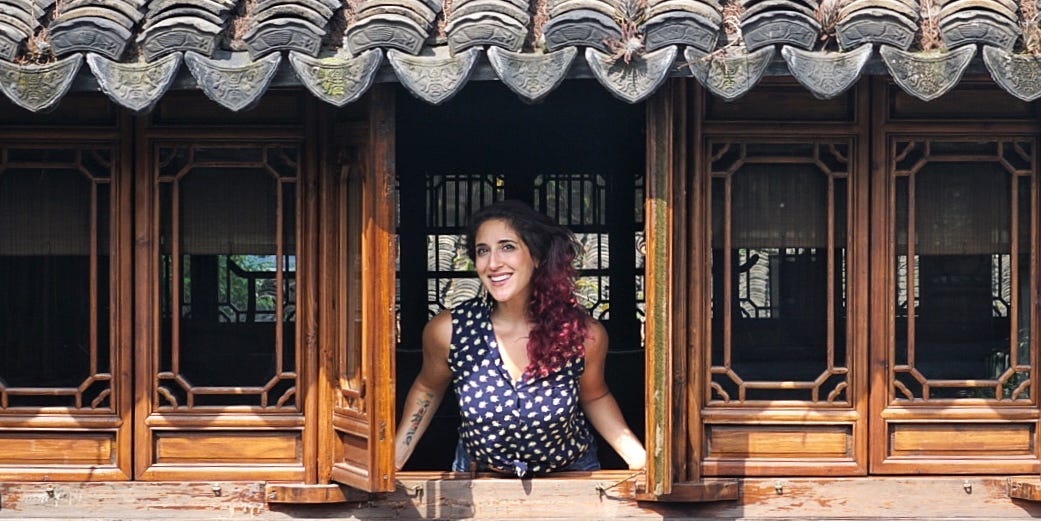
Take a look at our newest merchandise
I touched down in Shanghai from Chicago in 2015, armed with a year-and-a-half work contract, an overstuffed suitcase, and 20 extra bins en route. It was not probably the most standard method to arrive in a rustic I would by no means set foot in.
However after stints in Israel and Argentina, I noticed myself as a “international citizen,” satisfied I would settle in inside weeks. Spoiler: I used to be wildly overconfident.
The lesson got here swiftly: China doesn’t bend its will. As an alternative, one learns to adapt, to change one’s rhythm to the customs of this huge nation. I’ve discovered that the reply to most questions is merely, “as a result of China.”
We moved right into a high-rise advanced “maze” in Shanghai, which has a inhabitants equal to that of my husband’s hometown. Because the years handed, I realized to count on boiling tea at eating places even throughout sweltering months, and stopped being shocked when each face wash included skin-whitening components.
The mantra was used throughout many moments of frustration as I tried to navigate this overseas tradition.
Tradition shock, each methods
Throughout my first few years in China, I lived for these uncommon moments when an area would praise my minimal however slowly bettering Chinese language. But, it was extra frequent for kids to level at me and shout: “Look, mother, a laowai!” A foreigner.
Irrespective of what number of Chinese language landmarks I visited, cleaning soap operas I watched, popular culture references I realized, or hours I spent working towards writing Chinese language characters, I might endlessly be a laowai.
Sophie Steiner
On a current journey again to my hometown within the US, I took half in certainly one of my favourite end-of-summer pilgrimages: the Minnesota State Truthful — an annual ritual for each ever-affable Midwesterner, myself included — full of carnival parade antics, agricultural reveals, fireworks, and, most significantly, the overconsumption of all issues sugared, battered, and fried.
I weaved by means of the rows of American flags, snapping pictures. The unfamiliarity felt much like what I felt throughout my first 12 months in China, — mouth agape with reverse tradition shock. I did not slot in anymore with my football-throwing, beer-chugging, farm-friendly kin.
But once more, I discovered myself a foreigner, however this time in a well-recognized land.
Buddies really feel like foreigners
My definition of residence has advanced over time, and my on a regular basis practices have modified alongside it.
From perpetually consuming scorching water to remedy any ailment to counting on Conventional Chinese language Medication — like acupuncture and Chinese language herbs — relatively than Western cures, my values and beliefs have shifted in methods I by no means anticipated.
I’ll by no means totally belong in Chinese language tradition, simply as I’ll by no means fairly match into the mould of my American upbringing both.
This sense of alienation is a standard theme for a lot of expatriates. It is a bittersweet realization: the extra you adapt to a brand new tradition, the extra you danger dropping contact along with your roots.
By residing overseas, I’ve traded the dream of a home with 2.4 youngsters and a white picket fence for the liberty to microdose retirement — touring on a whim to far-flung islands throughout Asia.
Because the world turns into more and more multicultural, emotions of dislocation and juxtaposing belonging usually resonate. Whereas I’m technically not a “third tradition child” — a time period coined by sociologist Ruth Hill Useem referring to those that spend their childhood exterior their mother and father’ residence nation, leading to a scarcity of belonging in each locations — I discover myself a “third tradition grownup.”
I mix parts of my American upbringing with experiences gained in China, forming a distinctly fluid identification that does not fairly match into conventional classes.
I wrestle to narrate to family and friends again residence — they do not perceive my craving to hike the higher reaches of the Tibetan Autonomous Area or my fixation on black sesame desserts. All of it sounds overseas to them, simply as their experiences of refurbishing their rest room for the umpteenth time really feel overseas to me.
Sophie Steiner
My seek for belonging
Now, I’ve realized to embrace the “China moments” that come up with a humorousness and humility.
Throughout my early years in China, being referred to as laowai was a marker of my otherness. Now, I put on it as a badge of honor, proof of my journey and progress.
As I look forward, I acknowledge that my path isn’t just about navigating the complexities of being a foreigner overseas but in addition about reconciling that identification with my origins. Maybe I am not meant to belong totally wherever however as a substitute to seek out solace within the areas between cultures.
I embrace my life in Shanghai and the challenges that include it.
Do you might have a narrative to share about relocating to a metropolis in Asia? Contact the editor at akarplus@businessinsider.com.

![[Windows 11 Pro]HP 15 15.6″ FHD Business Laptop Computer, Quad Core Intel i5-1135G7 (Beats i7-1065G7), 16GB RAM, 512GB PCIe SSD, Numeric Keypad, Wi-Fi 6, Bluetooth 4.2, Type-C, Webcam, HDMI, w/Battery](https://m.media-amazon.com/images/I/71LYTzK2A8L._AC_SL1500_.jpg)




![[UPDATED 2.0] Phone mount and holder compatible with Samsung Z Fold 2 3 4 5 6 Pixel Fold or Foldable phone | bicycle, treadmill, handlebar, elliptical, stroller, rail, handle, roundbar, golf cart](https://m.media-amazon.com/images/I/51CjGlidGRL._SL1023_.jpg)








